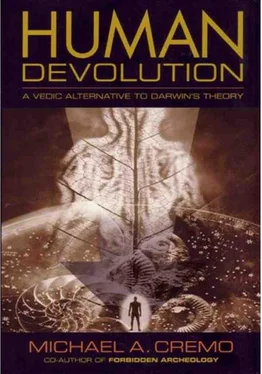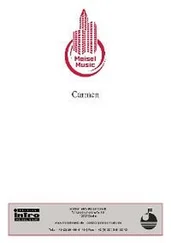Michael Cremo - Human Devolution - A Vedic Alternative To Darwin's Theory
Здесь есть возможность читать онлайн «Michael Cremo - Human Devolution - A Vedic Alternative To Darwin's Theory» весь текст электронной книги совершенно бесплатно (целиком полную версию без сокращений). В некоторых случаях можно слушать аудио, скачать через торрент в формате fb2 и присутствует краткое содержание. Год выпуска: 2003, ISBN: 2003, Издательство: Torchlight Publishing, Жанр: Старинная литература, на английском языке. Описание произведения, (предисловие) а так же отзывы посетителей доступны на портале библиотеки ЛибКат.
- Название:Human Devolution: A Vedic Alternative To Darwin's Theory
- Автор:
- Издательство:Torchlight Publishing
- Жанр:
- Год:2003
- ISBN:9780892133345
- Рейтинг книги:4 / 5. Голосов: 1
-
Избранное:Добавить в избранное
- Отзывы:
-
Ваша оценка:
- 80
- 1
- 2
- 3
- 4
- 5
Human Devolution: A Vedic Alternative To Darwin's Theory: краткое содержание, описание и аннотация
Предлагаем к чтению аннотацию, описание, краткое содержание или предисловие (зависит от того, что написал сам автор книги «Human Devolution: A Vedic Alternative To Darwin's Theory»). Если вы не нашли необходимую информацию о книге — напишите в комментариях, мы постараемся отыскать её.
Human Devolution: A Vedic Alternative To Darwin's Theory — читать онлайн бесплатно полную книгу (весь текст) целиком
Ниже представлен текст книги, разбитый по страницам. Система сохранения места последней прочитанной страницы, позволяет с удобством читать онлайн бесплатно книгу «Human Devolution: A Vedic Alternative To Darwin's Theory», без необходимости каждый раз заново искать на чём Вы остановились. Поставьте закладку, и сможете в любой момент перейти на страницу, на которой закончили чтение.
Интервал:
Закладка:
Iarchus compared the universe to a ship: “They set several pilots in this boat and subordinated them to the oldest and wisest of their number; and there were several officers on the prow and excellent and handy sailors to man the sails; and in the crew of this ship there was a detachment of armed men. . . . Let us apply this imagery to the universe and regard it in the light of a naval construction; for then you must apportion the first and supreme position to God the begetter of this animal, and subordinate posts to the gods who govern its parts; and we may well assent to the statements of the poets, when they say there are many gods in heaven and many in the sea, and many in the fountains and streams, and many round about the earth, and that there are some even under the earth. But we shall do well to separate from the universe the region under the earth, if there is one, because the poets represent it as an abode of terror and corruption” (Philostratus III, 25).
Once when the city of Ephesus was suffering from a plague, Apollonius determined that the cause was a demon disguised as an elderly beggar. Following the orders of Apollonius, citizens of Ephesus stoned the beggar. As soon as the order was given, fierce rays of light shot from the beggar’s eyes. After the stoning, the people removed the stones and found instead of the beggar’s body that of a demonic hound, smashed to a bloody pulp (Philostratus, IV, 10). Such incidents provide evidence that certain beings have the power to change the appearance and form of the gross physical body. If this can be done, perhaps beings with greater powers could be responsible not just for the changes of physical bodies, but their very production.
Some say Apollonius of Tyana died a natural death in Ephesus, attended by two maidservants. Others say he went to Lindus, where he entered the temple of Athena and mysteriously disappeared. Still others say he continued on to Crete, where he is also said to have disappeared in a temple, behind closed doors, outside which people heard a chorus of maidens singing, “Hasten thou from earth, hasten thou to Heaven, hasten” (Philostratus, VIII, 30).
After the death of Apollonius, a skeptical young man was studying philosophy in Tyana, the home town of Apollonius. He was doubtful about the existence of an immortal soul. He was particularly doubtful about the continued existence of the soul of Apollonius. “I myself,” he said to his companions, “have done nothing now for over nine months but pray to Apollonius that he would reveal to me the truth about the soul; but he is so utterly dead that he will not appear to me in response to my entreaties, nor give me any reason to consider him immortal.” Five days later, he awoke from a daytime sleep and asked those around him: “Do you not see Apollonius the sage, how that he is present with us and is listening to our discussions, and is reciting wondrous verses about the soul?” No one else could see or hear this. The young man repeated to them the following words from Apollonius (Philostratus, VIII, 31):
The soul is immortal, and ‘tis no possession of thine own, but of Providence,
And after the body is wasted away, like a swift horse freed from its traces,
It lightly leaps forward and mingles itself with the light air,
Loathing the spell of harsh and painful servitude which it has endured . . .
Alchemy, as practiced in the Hellenic world, had its basis in spiritual cosmology. In his book on magic in classical Greece and Rome, Luck (1985, p. 364) wrote: “The mystical side of alchemy is about as well documented as its practical side. It is marked by a quest for spiritual perfection, just as the search for precious metals involved the perfecting and refinement of raw materials. . . . Many alchemic operations can be understood as a sacrificial offering, as ceremonies to be accomplished after the alchemist himself has been initiated into some higher mysteries. A long period of spiritual preparation is indispensable. The ultimate goal of this process, as in the mystery religions, is salvation. Thus alchemy appears to be a Hellenic form of mysticism. Since the soul is divine in origin but tied to matter in this world and isolated from its spiritual home, it must, as far as possible, purify the divine spirit inherent in it from the contamination by matter. In his search for the materia prima, the alchemist discovers hidden powers within his own soul.” The practice of alchemy continued for centuries in Europe. Sir Isaac Newton, renowned as the father of modern science, wrote extensively on alchemical subjects.
The similarity of alchemical transformations of metals and the purification of consciousness is noted in the following text from a sixteenth century Sanskrit work, the Hari-bhakti-vilasa (2.12) , by Sanatana Goswami: “As bell metal is turned to gold when mixed with mercury in an alchemical process, so one who is properly trained and initiated by a bona fide spiritual master immediately becomes a brahmana ” ( Chaitanya Charitamrita, adi-lila, 7.47). A brahmana is one whose consciousness has been purified of the grosser material influences. A brahmana is also defined as one who knows Brahman, or absolute spirit. The ultimate state of Brahman realization is knowledge of the soul’s eternal loving relationship with God.
Mystical cosmologies, with similarities to our Vedic template cosmology, continued to dominate European thought after the time of the Greeks and Romans. We shall now review a sampling of these cosmologies.
Kabbalah is a school of Jewish mysticism that became prominent during medieval times, but which was founded in earlier schools of Jewish esoteric wisdom. The principal text of the Kabbalah was the Zohar . In the Zohar, we find elements that are reminiscent of my template Vedic spiritual cosmology. For one thing, the Kabbalah’s threefold concept of soul ( nefesh, ruah, and neshamah ) is related to the divisions of matter, mind, and spirit that form the basis of the human devolution idea. The Zohar says: “The ‘soul’ ( nefesh ) stands in intimate relation to the body, nourishing and upholding it; it is below, the first stirring. Having acquired due worth, it becomes the throne for the ‘spirit’ ( ruah ) to rest upon. . . . And when these two, soul and spirit, have duly readied themselves, they are worthy to receive the ‘super-soul’ ( neshamah ), resting in turn upon the throne of the spirit ( ruah ). The super-soul stands preeminent, and not to be perceived. There is throne upon throne, and for the highest a throne” (Scholem 1977, p. 44). The “super-soul” mentioned here is not the Vedic Supersoul, which is a localized manifestation of God Himself in the heart of each living entity. The neshamah of the Kabbalah would appear to correspond to the soul proper in the Vedic system, or, more to the point, the soul ( atma ) in touch with the Supersoul ( paramatma ). It might be correct to say that when the Vedic soul identifies principally with the gross physical body, it is like the nefesh; when it identifies with the subtle material body of mind and the vital force, it is like the ruah; and when it identifies with its own true nature as a particle of God’s own spiritual energy, then it is like the neshamah.
That the Kabbalah may be speaking of one soul that reveals itself in three ways is hinted at in this passage from the Zohar (Scholem 1977, p. 44), in which the three souls are compared to parts of a single flame: “The study of these grades of the soul yields an understanding of the higher wisdom. . . . It is nefesh, the lowest stirring, to which the body adheres; just as in a candle flame, the obscure light at the bottom adheres close to the wick, without which it cannot be. When fully kindled, it becomes a throne for the white light above it, and when these two come into their full glow, the white light becomes a throne for a light not wholly discernible, an unknowable essence reposing on the white light, and so in all there comes to be a perfect light.”
Читать дальшеИнтервал:
Закладка:
Похожие книги на «Human Devolution: A Vedic Alternative To Darwin's Theory»
Представляем Вашему вниманию похожие книги на «Human Devolution: A Vedic Alternative To Darwin's Theory» списком для выбора. Мы отобрали схожую по названию и смыслу литературу в надежде предоставить читателям больше вариантов отыскать новые, интересные, ещё непрочитанные произведения.
Обсуждение, отзывы о книге «Human Devolution: A Vedic Alternative To Darwin's Theory» и просто собственные мнения читателей. Оставьте ваши комментарии, напишите, что Вы думаете о произведении, его смысле или главных героях. Укажите что конкретно понравилось, а что нет, и почему Вы так считаете.












